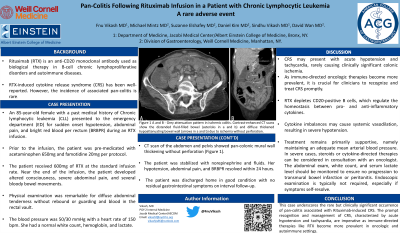Monday Poster Session
Category: Colon
P1689 - Pan-Colitis Following Rituximab Infusion in a Patient with Chronic Lymphocytic Leukemia (CLL) - A Rare Adverse Event
Monday, October 23, 2023
10:30 AM - 4:15 PM PT
Location: Exhibit Hall


Fnu Vikash, MD
Albert Einstein College of Medicine, Jacobi Medical Center
Bronx, NY
Presenting Author(s)
Fnu Vikash, MD1, Michael Mintz, MD2, Suzanne Elshafey, MD2, Daniel Kim, MD3, Sindhu Vikash, MD1, David Wan, BS, MD2
1Albert Einstein College of Medicine, Jacobi Medical Center, Bronx, NY; 2Weill Cornell Medicine, New York, NY; 3Weill Cornell Medicine-Qatar, Doha, Ad Dawhah, Qatar
Introduction: Rituximab (RTX) is an anti-CD20 monoclonal antibody used as biological therapy in B-cell chronic lymphoproliferative disorders and autoimmune diseases. RTX-induced cytokine release syndrome (CRS) has been well-reported [1]. However, the incidence of associated pan-colitis is rare.
Case Description/Methods: An 85-year-old female with a past medical history of Chronic lymphocytic leukemia (CLL) presented to the emergency department (ED) for sudden onset hypotension, abdominal pain, and bright red blood per rectum (BRBPR) during an RTX infusion. Prior to the infusion, the patient was pre-medicated with acetaminophen 650mg and famotidine 20mg per protocol. The patient received 600mg of RTX at the standard infusion rate. Near the end of the infusion, the patient developed altered consciousness, severe abdominal pain, and several bloody bowel movements. Physical examination was remarkable for diffuse abdominal tenderness without rebound or guarding and blood in the rectal vault. The blood pressure was 50/30 mmHg with a heart rate of 150 bpm. She had a normal white count, hemoglobin, and lactate. CT scan of the abdomen and pelvis showed pan-colonic mural wall thickening without perforation (Figure 1). The patient was stabilized with norepinephrine and fluids. Her hypotension, abdominal pain, and BRBPR resolved within 24 hours. The patient was discharged home in good condition with no residual gastrointestinal symptoms on interval follow-up.
Discussion: CRS may present with acute hypotension and tachycardia, rarely causing clinically significant colonic ischemia. As immune-directed oncologic therapies become more prevalent, it is crucial for clinicians to recognize and treat CRS promptly. RTX depletes CD20-positive B cells, which regulate the homeostasis between pro- and anti-inflammatory cytokines [2-5]. Cytokine imbalances may cause systemic vasodilation, resulting in severe hypotension. Treatment remains primarily supportive, namely maintaining an adequate mean arterial blood pressure. In severe cases, steroids or cytokine-directed therapies can be considered in consultation with an oncologist. The abdominal exam, white count, and serum lactate level should be monitored to ensure no progression to transmural bowel infarction or peritonitis. Endoscopic examination is typically not required, especially if symptoms self-resolve.

Disclosures:
Fnu Vikash, MD1, Michael Mintz, MD2, Suzanne Elshafey, MD2, Daniel Kim, MD3, Sindhu Vikash, MD1, David Wan, BS, MD2. P1689 - Pan-Colitis Following Rituximab Infusion in a Patient with Chronic Lymphocytic Leukemia (CLL) - A Rare Adverse Event, ACG 2023 Annual Scientific Meeting Abstracts. Vancouver, BC, Canada: American College of Gastroenterology.
1Albert Einstein College of Medicine, Jacobi Medical Center, Bronx, NY; 2Weill Cornell Medicine, New York, NY; 3Weill Cornell Medicine-Qatar, Doha, Ad Dawhah, Qatar
Introduction: Rituximab (RTX) is an anti-CD20 monoclonal antibody used as biological therapy in B-cell chronic lymphoproliferative disorders and autoimmune diseases. RTX-induced cytokine release syndrome (CRS) has been well-reported [1]. However, the incidence of associated pan-colitis is rare.
Case Description/Methods: An 85-year-old female with a past medical history of Chronic lymphocytic leukemia (CLL) presented to the emergency department (ED) for sudden onset hypotension, abdominal pain, and bright red blood per rectum (BRBPR) during an RTX infusion. Prior to the infusion, the patient was pre-medicated with acetaminophen 650mg and famotidine 20mg per protocol. The patient received 600mg of RTX at the standard infusion rate. Near the end of the infusion, the patient developed altered consciousness, severe abdominal pain, and several bloody bowel movements. Physical examination was remarkable for diffuse abdominal tenderness without rebound or guarding and blood in the rectal vault. The blood pressure was 50/30 mmHg with a heart rate of 150 bpm. She had a normal white count, hemoglobin, and lactate. CT scan of the abdomen and pelvis showed pan-colonic mural wall thickening without perforation (Figure 1). The patient was stabilized with norepinephrine and fluids. Her hypotension, abdominal pain, and BRBPR resolved within 24 hours. The patient was discharged home in good condition with no residual gastrointestinal symptoms on interval follow-up.
Discussion: CRS may present with acute hypotension and tachycardia, rarely causing clinically significant colonic ischemia. As immune-directed oncologic therapies become more prevalent, it is crucial for clinicians to recognize and treat CRS promptly. RTX depletes CD20-positive B cells, which regulate the homeostasis between pro- and anti-inflammatory cytokines [2-5]. Cytokine imbalances may cause systemic vasodilation, resulting in severe hypotension. Treatment remains primarily supportive, namely maintaining an adequate mean arterial blood pressure. In severe cases, steroids or cytokine-directed therapies can be considered in consultation with an oncologist. The abdominal exam, white count, and serum lactate level should be monitored to ensure no progression to transmural bowel infarction or peritonitis. Endoscopic examination is typically not required, especially if symptoms self-resolve.

Figure: Figure 1 A and B - Grey attenuation pattern in ischemic colitis. Contrast-enhanced CT scans show the distended fluid-filled bowel (asterisks in a and b) and diffuse thickened hypoattenuating bowel wall (arrows in a and b) due to ischemia without perforation.
Disclosures:
Fnu Vikash indicated no relevant financial relationships.
Michael Mintz indicated no relevant financial relationships.
Suzanne Elshafey indicated no relevant financial relationships.
Daniel Kim indicated no relevant financial relationships.
Sindhu Vikash indicated no relevant financial relationships.
David Wan indicated no relevant financial relationships.
Fnu Vikash, MD1, Michael Mintz, MD2, Suzanne Elshafey, MD2, Daniel Kim, MD3, Sindhu Vikash, MD1, David Wan, BS, MD2. P1689 - Pan-Colitis Following Rituximab Infusion in a Patient with Chronic Lymphocytic Leukemia (CLL) - A Rare Adverse Event, ACG 2023 Annual Scientific Meeting Abstracts. Vancouver, BC, Canada: American College of Gastroenterology.
